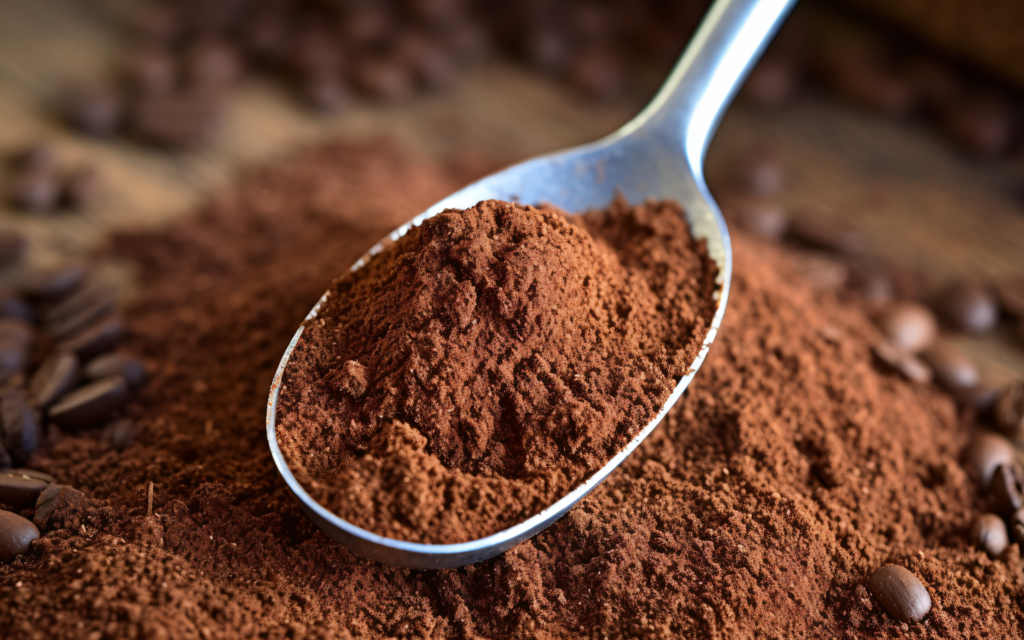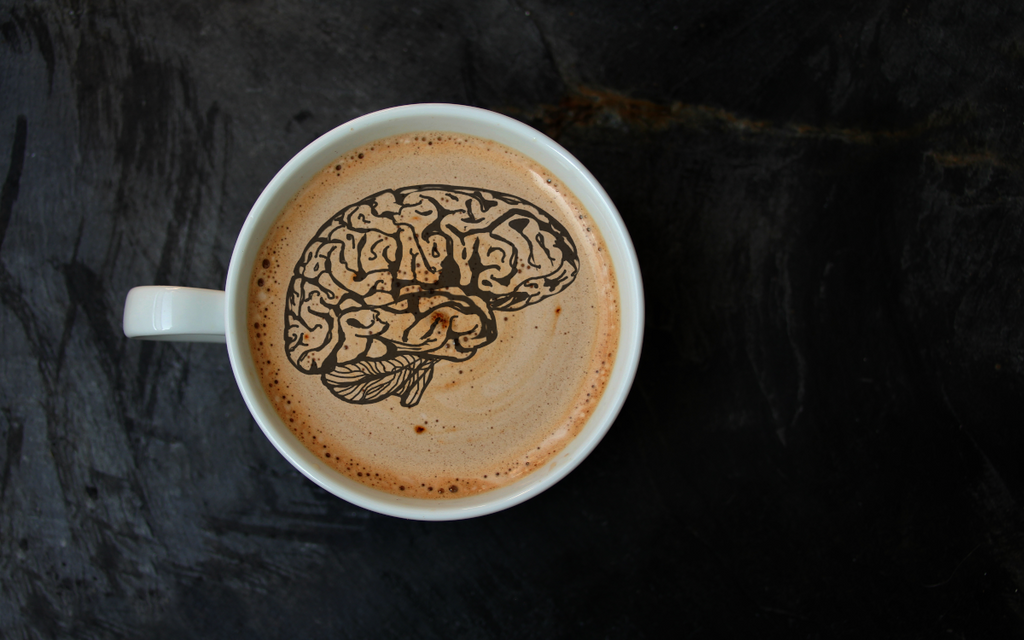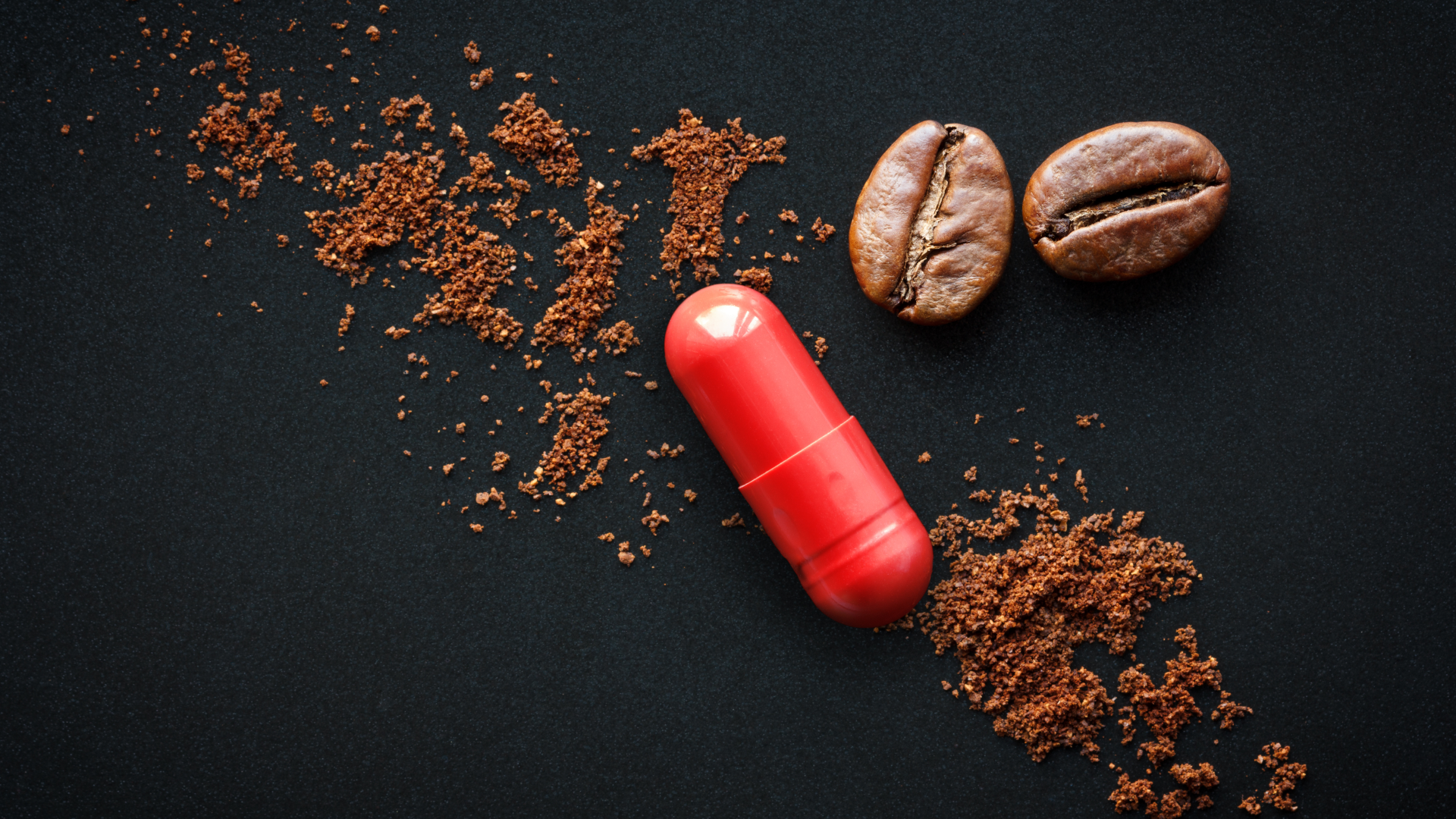Things you'll learn here |
Looking for a supplement that can make you feel more energetic and lift your mood? Well, you’ve come to the right place!
Whether you’re trying to boost your focus, enhance your mood or put a little spring in your step, the right supplement can be a bonus in your health and fitness journey. In addition to eating well, exercising regularly, and getting enough rest, there are supplements that can give you a helping hand on your weight loss journey.
Have you heard of caffeine anhydrous?
It has the potential to help with fatigue, low energy, and brain fog. This supplement can also boost physical performance, so you can get moving like never before. But, is it really worth taking?
Here we take a deep dive into caffeine in its various forms and explore its perks as well as its downsides.
We’re also going to explore how you might use caffeine anhydrous to enhance exercise performance and get steps ahead on your weight loss journey.
Ready? Let’s go!
How does caffeine work?

Caffeine is a nervous system stimulant reputed to eliminate drowsiness and bolster energy levels, giving you the focus to tackle the day ahead.
Not only that, caffeine has its fair share of benefits which can help support health goals you may have. But, it’s good to make an informed decision as to which type of caffeine to use and how much you should have.
For most people, it’s safe to consume caffeine in a moderate amount, with caffeine anhydrous providing a precise mg of caffeine for those monitoring intake. But having the stimulant in large doses or too frequently can pose health risks. So, let’s deep dive into one of the most talked about stimulants—caffeine anhydrous.
The science behind caffeine anhydrous
When you consume caffeine, it enters your brain via your bloodstream, mimicking adenosine (a more naturally occurring caffeine compound in your body).
Now, while adenosine is a neurotransmitter that causes you to slow down and feel sleepy, caffeine takes adenosine's place by attaching itself to specific receptors in your brain and blocks those relaxing effects. Instead, it causes the opposite reaction, helping to awaken and rejuvenate your brain—this makes you feel more alert.
Adenosine is a neurotransmitter that promotes relaxation and sleepiness by binding to its receptors in the brain.
When adenosine binds to its receptors, it slows down nerve cell activity, leading to feelings of drowsiness and fatigue. Caffeine anhydrous works by blocking these adenosine receptors, preventing adenosine from exerting its calming effects.
But that is not all it can do…
Anhydrous caffeine can also help to boost the effects of other natural stimulants in your body, including dopamine, norepinephrine, glutamate, and adrenaline.
Quick note: Caffeine works whether you have it from its natural source or as caffeine anhydrous. Either way, you'll begin feeling the effects of caffeine within an hour, and it will wear off after three to four hours.
What is caffeine anhydrous?

So what is Caffeine Anhydrous? anhydrous is a form of caffeine that is dehydrated, which means it contains minimal to no water content. It’s a powdered form of caffeine often used in dietary supplements, energy drinks, and caffeine pills.
Would you believe that anhydrous caffeine is a naturally occurring substance you can find in roughly 60 different plant species? It's true. Yet of those 60 plants, most people are more familiar with coffee beans, tea leaves (green tea) and cacao.
What the difference between Caffeine and Caffeine Anhydrous?
They may look different, but chemically they are the same.
Take, for example, caffeine anhydrous. It comes from the seeds and leaves of coffee plants. But, unlike traditional coffee (cacao and coffee beans), which are natural substances rarely altered, caffeine anhydrous differs because all of its water—and other chemical components—have been completely filtered out, leaving behind a white crystalline powder.
In other words, caffeine anhydrous is a processed, dehydrated form of highly concentrated caffeine from coffee that is easily added to gum, sports drinks and energy bars to help boost energy, weight loss and physical performance.
Caffeine anhydrous: Pros and cons at a glance…
Pros: It can provide you with a more standard caffeine dose compared to drinking traditional coffee or tea. It’s also easier to carry around as you can take in the form of pills, gums and gels, and it can improve your athletic performance
Cons: Pure caffeine powder is more potent, increasing the risk of a caffeine overdose or intoxication.
What types of caffeine do I need to look out for?
- Caffeine pills come in two forms: weight loss supplements (designed to increase fat burn) and athletic enhancers. In both cases, they can increase feelings of alertness and energy.
- Caffeine anhydrous powder, recognized for its caffeine anhydrous benefits, becomes a preferred caffeine source for many looking for a powerful boost. But, the FDA advises to avoid pure powdered anhydrous caffeine due to its potency.
- Other caffeine forms like food product additives, including gums and energy bars to help boost energy and stimulate weight loss. It can also be found in pre-workout supplement powders as a concentrated caffeine source for enhanced training effects.
How can I use anhydrous caffeine for weight loss?

Caffeine can help to boost weight loss and your physical performance. But how does a caffeine supplement work, particularly one containing a specific mg of caffeine anhydrous for enhanced benefits?
Increase metabolism
The rate at which you burn calories is your resting metabolic rate (RMR). Caffeine can help to raise your RMR by three to 11%, helping to increase your weight loss (when combined with exercise and a healthy diet).
Boosts fat burn
Caffeine can help to stimulate your nervous system by increasing the presence of epinephrine in your bloodstream (as well as raising heat production).
This sends signals directly to your fat cells, telling them to break down fat and release it into your blood.
Now, if you do nothing, you’ll struggle to reach your weight loss goals. But, if you make the effort to burn more calories than you consume, you’ll lose weight consistently. And, taking caffeine before you workout can release 30% more stored fat.
Reduces appetite
During one study exploring caffeine's appetite-reducing effects (on men), caffeine enabled them to eat less during meals. So, there is a chance that a moderate dose of caffeine can help you curb your cravings and stay fuller for longer.
How much caffeine should I have?

The amount of caffeine you can consume will partially depend on your body weight. Usually, dosages are based on 1.4 to .7mg per lb of body weight, which means you can consume 200 to 400mg of caffeine daily.
That said, you should NEVER have more than 400mg of powdered caffeine daily because of the risk of intoxication.
Instead, aim to start small with just 150 to 200mg of caffeine a day (consumed 60 minutes before exercise) and then assess your tolerance or reaction to it. Only increase if you experience no adverse side effects.
If you are wary for any reason, or you have a medical condition, please consult a healthcare professional before introducing any caffeine supplement.
Read more: PhenQ vs. Traditional Weight Loss Methods: Which is Right for You?
What are the benefits of caffeine anhydrous pills?

Caffeine pills are a popular form of supplementation that offer several potential benefits. Let’s get into it!
Exercise performance
Numerous studies and reviews show that caffeine (natural or otherwise) can enhance your endurance levels and physical performance while running or cycling.
A meta-analysis published in the Journal of the International Society of Sports Nutrition noted that caffeine could improve specific muscular strength and power measurements in participants.
Admittedly, there doesn't appear to be a standard approach to administering Caffeine— when it comes to exercise. But, most athletes seem to opt for caffeine pills as it is easier to control the dose (compared to drinking it) and keep your body safe, often choosing caffeine anhydrous for its direct impact on sprint performance and endurance.
Reduces fatigue
As a central nervous stimulant, caffeine can help you to feel more alert and less tired.
Improves concentration
Studies suggest that caffeine, especially in the form of caffeine anhydrous, can improve various aspects of cognitive function, including memory, attention, and reaction time, by providing a concentrated dose of mg of caffeine
This is beneficial for people who are constantly required to give a lot of mental effort and concentration to tasks on a daily basis.
Increased weight loss
Boosting your metabolism and stimulating increased fat burn and can help you burn more calories and lose weight.
Headache relief
It’s effective at relieving tension headaches (especially when it is combined with ibuprofen).
Rich in antioxidants
This prevents or slows down cell damage thanks to caffeine being rich in certain antioxidants.
What are the side effects of caffeine?

This is a tricky one, as it depends on how you’re taking it.
When it comes to drinking coffee, it is safe to drink 400mg of coffee a day (four to five cups). Similarly, you should have no more than 200mg in a single dose.
But what about caffeine anhydrous side effects?
To date, it has been linked to…
- Increased risk of erratic heartbeats
- Frequent urination
- Calcium loss
- Increased anxiety, nervousness, and insomnia.
- Headaches
- Restlessness
- Nausea or lack of appetite
- Diarrhea
- Heightened cholesterol levels (due to the chemicals found in coffee)
Lifestyle tips to improve your health
Caffeine or any other kind of weight loss pill should complement a healthy, happy balanced lifestyle.
So, tweaking your daily routine will empower you to create a healthy and sustainable approach to weight loss.
Here are some tips to support you to do just that…
Adopt healthy eating habits
Focus on whole, nutrient-dense foods such as fruits, vegetables, lean proteins, whole grains, and healthy fats. Monitor portion sizes to avoid overeating.
Exercise regularly
Weave regular exercise into your routine, aiming for at least 150 minutes of moderate-intensity aerobic activity or 75 minutes of vigorous-intensity aerobic activity a week. Choose an activity that makes you feel good, and you can’t lose. Even a little dancing will do.
Drink plenty of water
Stay hydrated throughout the day. Limit consumption of sugary drinks, fruit juices, and energy drinks, as they can affect your health.
Improve sleep hygiene

Aim for seven to nine hours of quality sleep a night. Poor sleep quality and insufficient sleep have been linked to weight gain and increased cravings for unhealthy foods.
Establish a regular sleep schedule and create a relaxing bedtime routine to improve sleep quality.
Improve stress management
Find healthy ways to manage stress, like exercise, mindfulness, meditation, deep breathing exercises, yoga, or spending time with loved ones.
Surround yourself with a supportive network
Link up with friends and family who can provide encouragement, accountability, and motivation on your health journey.
To put a much-needed spring in your step and smash those weight loss goals, check out our guide on how to keep your energy levels up.
Final thoughts…
Caffeine anhydrous can be a good solution for boosting energy, tackling concentration struggles, enhancing endurance performance, improving mood and even supporting weight loss goals due to its concentrated caffeine content. Studies pointing towards its ability to increase fat burn, energy, and metabolism can help with fitness and health goals.
While adding supplements to your lifestyle can enhance certain aspects of your health, proper nutrition, regular exercise, and great sleep hygiene are essential for your overall wellbeing.
But, while consuming caffeine offers major benefits that can be life-changing for some, there are downsides.
If you’re not careful, there are dangerous risks of intoxication, overdose, and other unpleasant side effects. It’s best to stay informed on safe dosages to avoid any danger—and DEFINITELY avoid pure powdered caffeine.
Meet PhenQ
PhenQ is a natural supplement that is scientifically curated with powerful ingredients to support your weight loss journey.
The PhenQ weight loss pill targets multiple aspects of weight loss, tackling cravings, fat accumulation, low energy and mood issues—promoting a holistic approach to your goals.
PhenQ’s formula is backed by scientific research and positive customer testimonials, making it a reliable choice for those struggling with weight loss. Why not give it a try today?
FAQs
How much caffeine should I consume a day?
The recommended daily caffeine intake can vary depending on factors such as individual sensitivity to caffeine, age, weight, overall health, and tolerance levels.
But general guidelines suggest that moderate caffeine consumption is safe for most healthy adults.
For healthy adults, The U.S. Food and Drug Administration (FDA) has cited moderate caffeine consumption to be about 400 milligrams per day for most adults.




